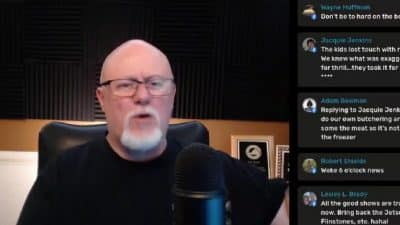
[email protected]
The economy, Iraq, health care and interestingly, term limits. Voters in the Sixth District were able to get a glimpse into the differing approaches of Republican incumbent Bob Goodlatte, Democrat Sam Rasoul and independent Janice Lee Allen on those issues and others in a candidates forum sponsored by WSVA-550AM in Harrisonburg this morning.
Goodlatte was in the crosshairs for his stance on term limits dating back to his famous 1992 proclamation that he would limit himself if elected to six terms in the U.S. Congress. His run this fall is for a ninth term. Goodlatte defended his reversal on his term-limits pledge by saying that term limits “serve a very good purpose, but they need to apply equally to everyone in the Congress for that rotation to work. Otherwise those congressional districts that do not have members who take individual term limits will have the power. They should apply equally to everyone.”
Goodlatte said later in his answer to the question on term limits that he had been asked by “hundreds of people” in the Sixth to continue to serve. “And I said, You know what, we have term limits every two years, and people get the opportunity to vote,” the congressman said. “I will continue to take the stand that I agree with my opponent on that term limits are a good thing for the reason cited, rotation, but if I had stepped aside while other members from other districts did not, this district would have not had the opportunity to have the leadership on the Agriculture Committee, to serve on that committee,” Goodlatte said.
Rasoul pointed out the political doubletalk in the answer. “It’s important to frame this correctly. You are going to hear a discussion about term limits that has two sides. The person who has been in office longer is going to have a certain seniority, is going to be able to bring certain things back to the district that a freshman congressman is not going to be able to. We have to balance that with, what are the inefficiencies that are created when people sit up there for an indefinite period of time, they hoard all this power, and they’re not coming up with new and fresh ideas?” said Rasoul, the first Democratic challenger for Goodlatte since 1998, a period spanning what would have been the end of Goodlatte’s promised self-imposed term limitation that would have had him stepping down in 2005.
“The whole purpose of the United States House of Representatives as set up by our Founding Fathers was for it to be turned over very quickly. That way we could respond to the needs of the people. They would turn over in their graves if they knew that the Senate had a lower incumbency rate than the House of Representatives. Because they knew that we would need to be able to react to the needs of the people very quickly,” Rasoul said.
“I don’t have anything against career politicians. I just say, Move on to something else. If you have been a good congressman or good senator for a number of years, move on to statewide office, or maybe it’s your turn to run for president. Everybody else is,” Rasoul said.
There were points of agreement – most significantly with Allen, who cut several of her answers short after saying that she agreed with Goodlatte’s positions on issues including energy policy to tax policy. The major-party candidates, too, agreed more than they disagreed on what needs to be done to get the U.S. economy moving again. Rasoul’s economic plan calls for what he terms “a green revolution,” with targeted public and private investments in industries that are working to develop green energy technologies. “We can invest in wind, solar, biomass, geothermal. This isn’t theory, folks. This is actually happening in other nations that are actually making money here in the United States,” Rasoul said. Goodlatte, in laying out his strategy, touted the arrival in 2006 of SRI International to Harrisonburg to partner with James Madison University on the development of new medical and other technologies. “There is a tremendous amount of research that results in the development of businesses, and economic development will boom. But we also need to make sure that we are doing the things in Washington to allow this economy to grow in all of its sectors,” Goodlatte said.
On health care, Goodlatte and Rasoul diverge on how it would be best to extend health coverage to more Americans who are either uninsured or are underinsured. “It is important that we do a number of things to help those who are having health-care problems. I do not, however, support a national health-care system or national health insurance, because that will take choices away from people who utilize that system,” Goodlatte said. “What that has the effect of is that if the government is providing all the funding for health care, they will make the decisions on how much doctors and hospitals and others get paid, they will decide what things are covered and what are not, just like with Medicare today. Many things are not covered, and people have to buy supplemental coverage,” Goodlatte said. Rasoul advocates a third way. “On the far left, you’ve got people saying, Well, we need socialized medicine. On the far right, they say, Well, the private industries will take care of us all. There is a middle here,” said Rasoul, who supports HR 676, a hybrid system that extends health coverage to millions more Americans while protecting the freedom of those who have health-care plans that they like in the private sector to be able to keep their current coverage.
On Iraq, Rasoul supports a plan for withdrawal similar to those plans that have been endorsed by President Bush, Democratic Party presidential nominee Barack Obama and the Iraqi government that would put a defined timetable on the table. “As a nation, we’re going broke. Our nation is falling apart from within, and so many domestic priorities are being neglected. We must withdraw from Iraq in a responsible way,” said Rasoul, who has proposed a drawdown plan that would withdraw the bulk of American troops from Iraq in an 18- to 24-month period. “We cannot continue to afford to police the world while things are falling apart here at home. We are spending hundreds of billions of dollars that are being wasted away abroad while we can’t provide quality jobs here at home, our economy is deteriorating, we can’t provide health care for our own people. As the greatest, most powerful company in the world, this is unacceptable,” Rasoul said. Goodlatte, for his part, backs the strategy advocated by Republican presidential nominee John McCain. “Because of our brave men and women in Iraq, and their leaders like Gen. Petraeus, we have now done a great job of making sure that Iraq is secure. The situation has improved there dramatically, and we have made tremendous progress in getting the Iraqis to understand that they have to take responsibility for their own future, so much so that they are now talking about the United States withdrawing. And we certainly want to accomplish that. But to set a definite timetable is a mistake,” Goodlatte said.
Neither of the major-party candidates wanted to explicitly endorse the tax plans of their party’s presidential candidates, though when pressed Goodlatte channeled McCain in saying that “we need to keep taxes low to encourage the investment and the creation of jobs,” while Rasoul similarly channeled Obama in endorsing targeted tax cuts for the middle class. “Being a small-business owner and a fiscal conservative, yes, we have to cut taxes, but we’ve got to cut taxes where it counts,” Rasoul said. “This theory of trickle-down economics that we’ve heard about for decades, it doesn’t work, folks. We’ve had a chance to watch it in action, and look at yourselves now. Do you think you’re better off now than you were 10 years ago, 20 years ago? You’ve got to take a serious look at that,” Rasoul said.










